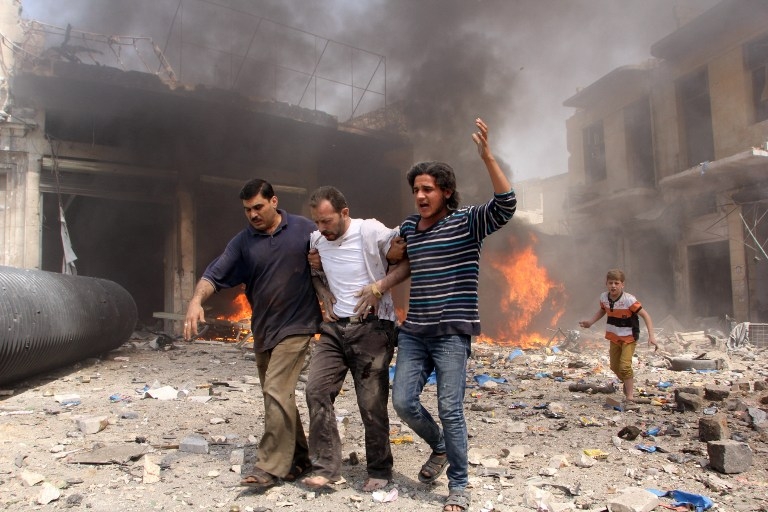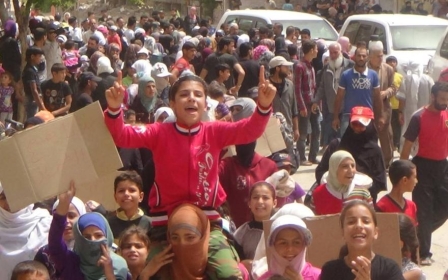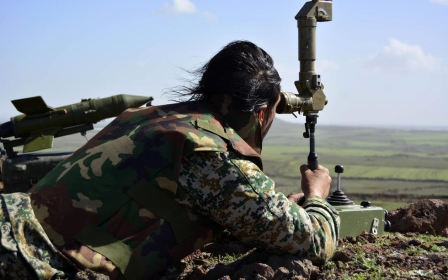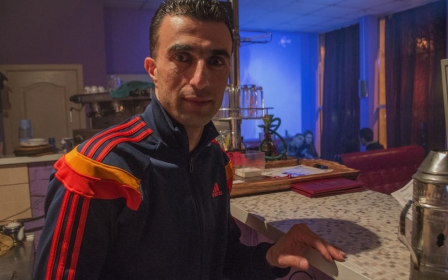Syria government barrel bombs kill 37 as IS pushes Hasakeh offensive

At least 37 people were killed in government barrel bomb attacks in northern Syria on Wednesday, a monitoring group said, while in the northeast Islamic State militants neared the gates of provincial capital Hasakeh.
The Syrian Observatory for Human Rights said the deaths came in three incidents, in Aleppo province in the north and Idlib province in the northwest.
In Tal Rifaat in Aleppo, 18 people were killed, including eight children, when government helicopters dropped at least four of the devices, the Britain-based monitor said.
In the rebel-held eastern neighbourhood of Jubb al-Qubbeh in Aleppo city, 11 civilians died, among them two children, when a barrel bomb exploded.
And in Idlib province, eight members of one family were killed in a barrel bomb attack in the town of Kafr Sijna.
The Observatory, which relies on a network of sources on the ground, said the tolls in the incidents were expected to rise because of the number of people seriously wounded.
Regime barrel bombs - crude weapons made of containers packed with explosives - have often hit schools, hospitals and markets in Syria.
Rights groups criticise them as indiscriminate, saying they kill a disproportionate number of civilians.
'At the gates'
Meanwhile, IS pressed its assault on the northeast Syrian city of Hasakeh, detonating at least five car bombs as it advanced towards the city.
The Observatory said IS was "at the gates of Hasakeh" after a day of fierce clashes, with many dead on both sides.
"(The clashes) ended with IS seizing all of the military checkpoints south of the city. The toll is 27 forces from the army and its loyalists, and at least 26 IS jihadists," said the monitoring group's head Rami Abdel Rahman.
The capture of Hasakeh would give the group control of its second provincial capital after their capture of Raqa last year.
Syrian state TV also reported the five car bombings, but said they had all struck a prison still under construction.
Abdel Rahman said IS had sent reinforcements of at least 400 fighters from the eastern province of Deir Ezzor for the Hasakeh assault, which began on 30 May.
He said IS was within 500 metres of the city, and that regime helicopters were dropping barrel bombs on militant positions.
Syrian President Bashar al-Assad has denied that his forces use barrel bombs, but evidence collected by activists and rights groups includes footage of the barrels being pushed from helicopters.
Human Rights Watch has also said there is "strong evidence" the regime has dropped barrel bombs containing toxic chemicals on northern Syria.
On Wednesday, the New York-based group said it had led an investigation into three attacks in Idlib province, which killed two people and affected 127 others, and that deadly chlorine was probably used in some, if not all of them.
"The Syrian government has used barrel bombs with toxic chemicals for more than a year while the (UN) Security Council has failed to act," said Philippe Bolopion, HRW's UN and crisis advocacy director.
In March, the UN Security Council adopted a resolution in which it voiced concern that toxic chemicals had been used as a weapon in Syria and threatened to slap sanctions against any party using them in Syria.
“The Syrian government has used barrel bombs with toxic chemicals for more than a year while the Security Council has failed to act,” Bolopion had said.
“If Security Council members still have doubts about who is to blame for these attacks, they should immediately create a mechanism to identify responsibility for these attacks so they can start discussing how to hold them accountable," he added.
More than 220,000 people have been killed in Syria since the conflict began in March 2011 with anti-government demonstrations that were met with a regime crackdown.
Stay informed with MEE's newsletters
Sign up to get the latest alerts, insights and analysis, starting with Turkey Unpacked
Middle East Eye delivers independent and unrivalled coverage and analysis of the Middle East, North Africa and beyond. To learn more about republishing this content and the associated fees, please fill out this form. More about MEE can be found here.




